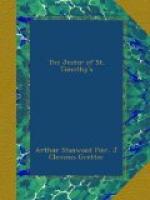THE BAITING OF A MASTER
The room in which the Sixth Form assembled for the lesson in Geometry was on the top floor of the Study building; the windows overlooked the pond behind the Gymnasium. The teacher’s desk was on a platform in the corner; a blackboard extended along two walls; and there were steps beneath the blackboard on which the students stood to make their demonstrations.
Irving arrived a minute before the hour and found his class already assembled—a suspicious circumstance. There was, too, he felt, an air of subdued, joyous expectancy. He took his seat and, adjusting his spectacles, peered round the room; his eyesight was very bad, and he had, moreover, like so many bookworms, never trained his faculty of observation.
He read the roll of the class; every boy was there.
“Scarborough, you may go to the blackboard and demonstrate the Fifth Theorem; Dennison, you the Sixth; Westby, you the Eighth. The rest of you will solve at your seats this problem.”
He mounted to the blackboard himself and wrote out the question. While he had his back turned, he heard some whispering; he looked over his shoulder. Westby was lingering in his seat and had obviously been holding communication with his neighbor.
“Westby,”—Irving’s voice was sharp,—“were you trying to get help at the last moment?”
“I was not.” Westby’s answer was prompt.
“Then don’t delay any longer, please; go to the blackboard at once.”
“Yes, sir.”
Westby moved to the blackboard on the side of the room—the one at right angles to that on which Irving and Scarborough were at work.
Irving finished his writing, dusted the chalk from his fingers, and returned to his seat. The boys before him were now bent industriously over their tablets; Scarborough, Westby, and Dennison were drawing figures on the blackboard, using the long pointers for rulers and making beautiful circles by means of chalk attached to pieces of string. A glance at Westby showed that youth apparently intent upon solving the problem assigned him and at work upon it intelligently. Irving began to feel serene; he proceeded to correct the algebra exercises of the Fourth Form, which he had received the hour before.
A sudden titter from some one down in front, hastily suppressed and transformed into a cough, caused him to look up. Morrill, with his mouth hidden behind his hand, was glancing off toward Westby, and Irving followed the direction of the glance.
Westby had completed his geometrical figures and was now engaged in labeling them with letters. But instead of employing the usual geometrical symbols A, B, C, and so on, he was skipping about through the alphabet, and Irving immediately perceived that he was not choosing letters at random. Irving observed that the initials of his own name, I, C, U, formed, as it were, the corner-stone of the geometrical edifice.




